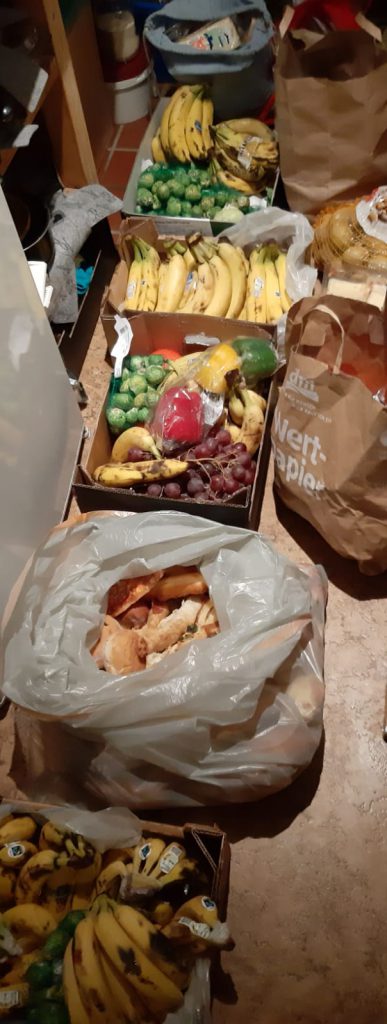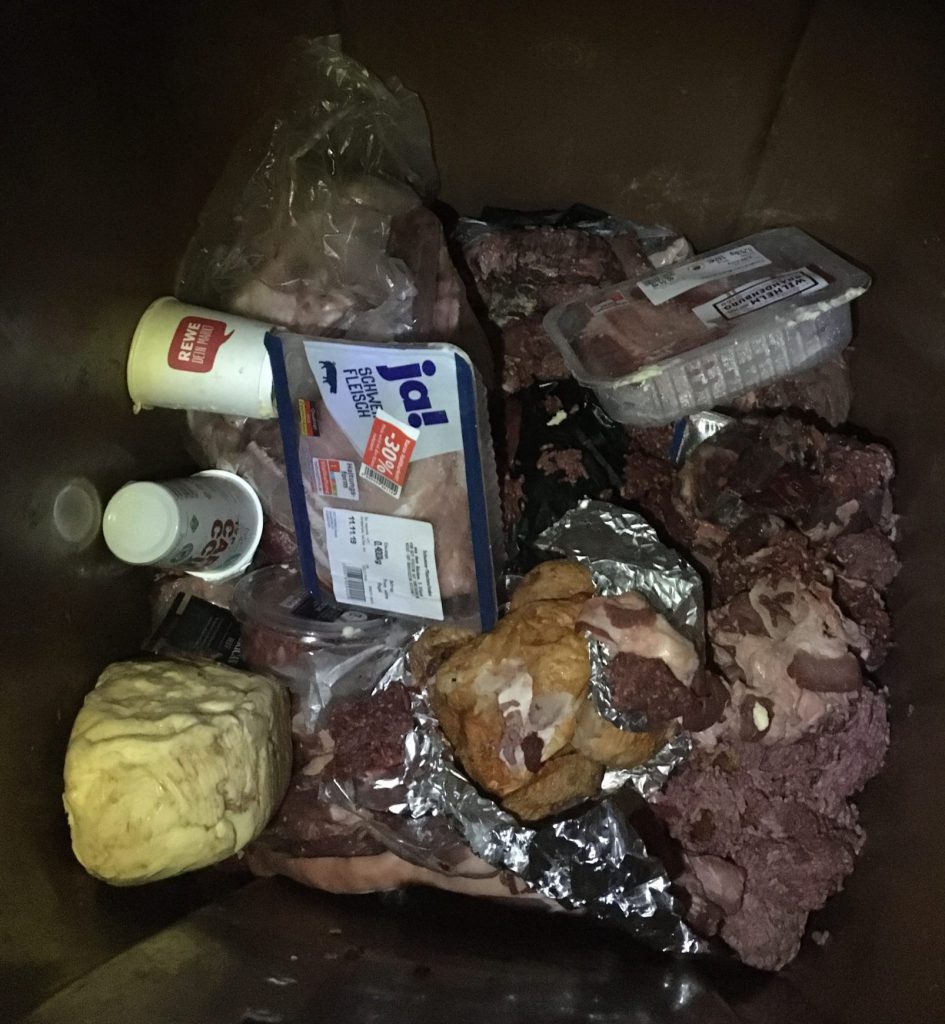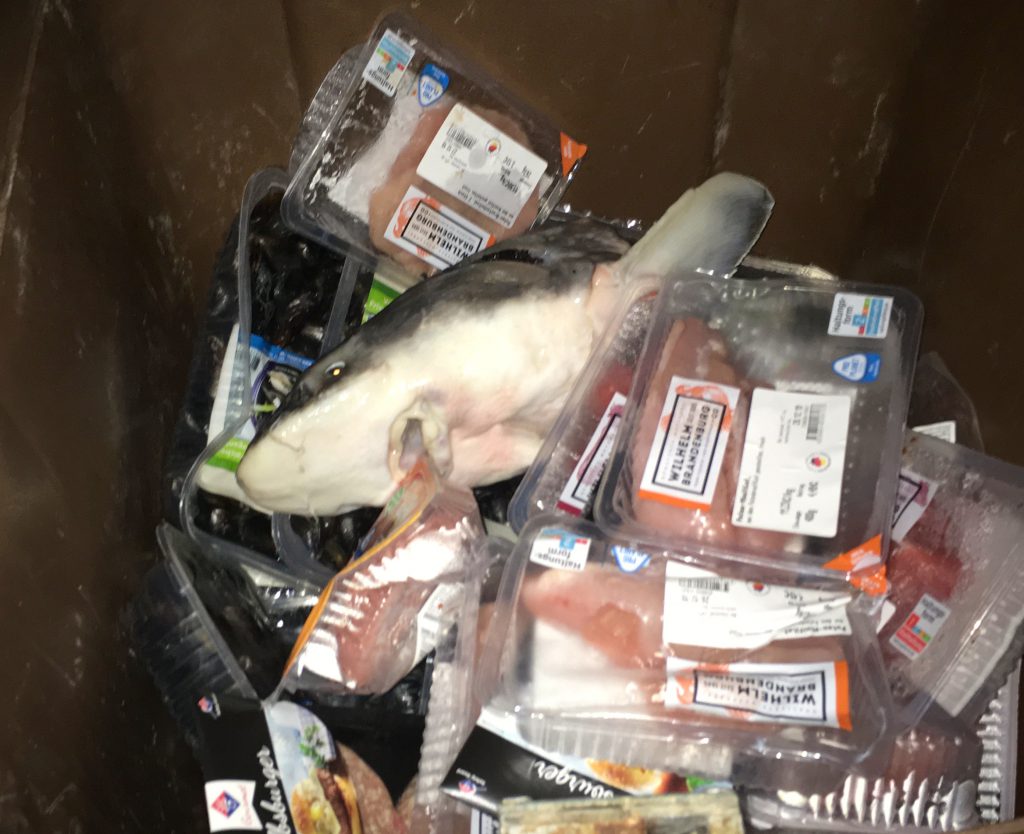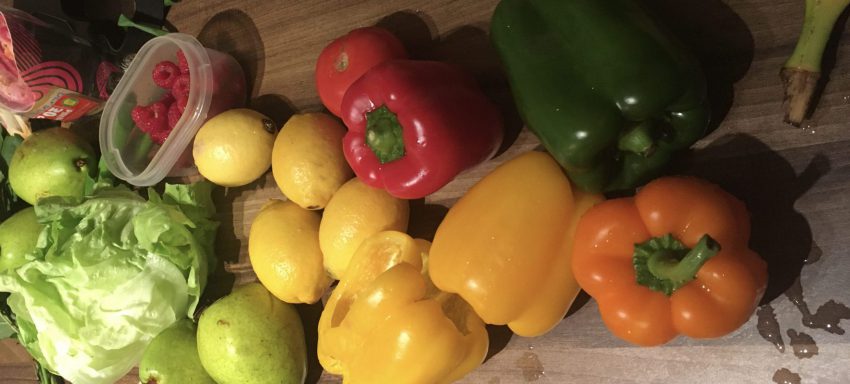Containering, also referred to as dumpster diving or skip diving, is an activity in which people go, well, dumpster diving in the dumpsters of supermarkets, cafés and delis to find food that is still perfectly edible and was simply thrown away because it was not pretty enough, or had passed its sell-by-date.

In the extremely shocking but interesting and inspiring Peg Legs movie Just Eat It: A Food Waste Story by Grant Baldwin, we can see how easy and surprisingly clean it is to live off of the food our (wealthy) societies throw away. Many people believe, this is only a way people living in extreme poverty get by. While that is partially true, in Europe, it has actually become somewhat of a fashionable thing among students to boost their low budget by saving money on food and go containering. Many environmentally conscious people do it, not necessarily for financial reasons, but also to prove a point: That we can feed the world, if only we weren’t so wasteful and greedy. Studies have shown that in the western world, an average household throws away about 1/4 of the food they buy. That does not include the food that never leaves the shop or does not even make it to the shop for silly reasons like the label being glued on crooked.
If you feel shy about digging through a dumpster, you can always ask. I once saw a lady order an entire Pizza, eat one slice and then leave. I asked if I could doggy-bag her pizza. The waiter actually seemed happy not to have to toss it.
Also, weekly markets have many cuttings leftover at the end of the day. Ask the green grocer for something for your herbivorous pet (no kale-family items for guinea pigs or bunnies, hey). Ask the butcher or fishmonger for a treat for your carnivorous pet.
A Word of Caution
Depending on the country or municipality you are living in, containering may be illegal. Also, breaking and entering is to my knowledge illegal everywhere. I am not prepared to get myself into legal trouble by advising you to do illegal stuff so with this: I am not advising you to go dumpster diving in areas where it is illegal and I am not advising you to break and enter anywhere! I advise you to check the legality of containering in your area (this link may be helpful to you and this link is useful to US-Americans) and look for unlocked dumpsters or check the garbage pickup timetables and wait for the time when the dumpsters are brought outside for pickup. Also beware: Some places prevent skip divers from taking their discarded food, by pouring certain liquids or powders on top of everything. That’s nasty and potentially poisonous so do not get into there!

Oh, and usually, shops will throw away their food in the evening, before closing. Then you will retrieve it just a few hours later. Sometimes though, the stuff has been sitting in the bin all day and in summer, temperatures can get high inside the bins. Do not take things you feel doubtful about. And always check packaging for holes. Fruit and vegetables, if undamaged, can simply be peeled when you are ready to eat them.
Always wash your bounty with soap before putting it in your storage.
Never take more than you / your household are able to consume. You are not the only one out there, and some of the people depend on this food source.
My Personal Experience

My most fruitful period containering was last year, when I was studying in England. I spent a lot of time with a friend on my course, Sagar, who was from India, and constantly outraged about how much food people throw away in the cafeteria. Not too outraged though, because he would go past the racks were people return their trays, and take uneaten food. He would come in, buy a portion of chips (french fries) for £1, and then add to the meal from all the leftovers on the rack. After a while, I did it too, but only when I had previously seen the student return the tray, and somehow convinced myself that this individual did not seem to have the plague. I never got the plague. But I cannot recommend cold chips…
During my work on my dissertation, I often stayed at the library late. On my way home I would come by the backstreet where all the campus Cafés had their bins and I would sometimes get the baked goods that did not sell that day. They had been prepackaged in plastic bags an labelled. Once I got particularly lucky. I found super expensive deluxe sandwiches from the Deli. I gave about half to Sagar and my housemates and still had enough to eat for the next two days. Which was especially great as I had been stressed out of my mind, writing a dissertation and had been just feeding myself off of wine gums and coffee.

Towards the end of the year, the campus supermarket closed for the summer and I sat in the library all day, glancing down at the street watching them get rid of all the ready meals and vegetables, anything that would not keep for the next six weeks. I came home that night with sandwiches (the British sure love their sandwiches), fresh strawberries, cabbage and humus for days! I was so excited, and my bike so overloaded on the way home, I texted it to Sagar, my scavenger friend. He said he was proud of me.


Well I agree in less waste. The students shouldn’t put more on their trays then they can eat in the first place. However eating something because it is there and shouldn’t be wasted, when you are not hungry and don’t need it is not such a good idea. Good if you can give it to hungry people.
Like!! Great article post.Really thank you! Really Cool.
Wonderful! Thank you for your comment 🙂